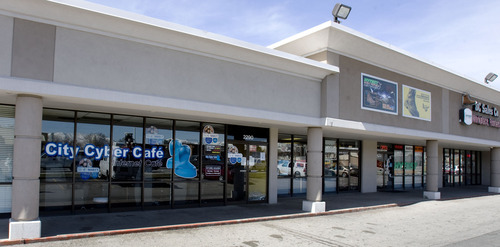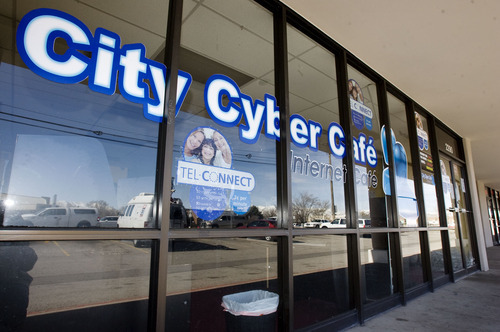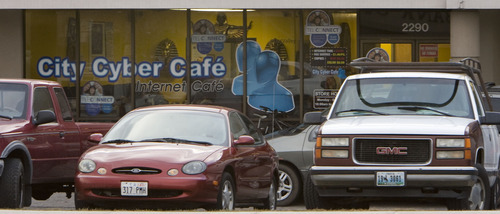This is an archived article that was published on sltrib.com in 2011, and information in the article may be outdated. It is provided only for personal research purposes and may not be reprinted.
Get out of town.
That's the message three Utah cities conveyed during the past year to City Cyber Cafés, a chain of stores accused of being a public nuisance and, perhaps, a home to gambling.
A Wednesday night police raid at the chain's West Valley City location, 2290 S. Redwood Road, marked the third time authorities in the Beehive State have challenged the way it operates its stores, which offer phone cards, Internet service and sweepstakes games.
Before the raid closed its doors, turning on a computer at the West Valley City store did bring up games mentioning blackjack or poker that noiselessly mimicked the machinery of Las Vegas, Atlantic City, N.J., or an American Indian casino.
But is the chain offering gambling — illegal in Utah — or merely supplying games with a chance at cash or prizes?
—
The raid • The issue for prosecutors here and in other states is the legality of the computer-generated games and their role in the daily business of the stores, which included operations in South Ogden and Layton.
The West Valley City police sweep also hit a similar store with different owners, Digital Connection, 4660 S. 4000 West.
The raid ended with 67 people detained and later released, some of them patrons in the stores at the time of the bust. Eighteen people were arrested for various reasons, ranging from outstanding warrants to drug-related charges. Also arrested on suspicion of several felonies was the City Cyber Café store's manager.
Some of those detained or arrested may face gambling charges, said West Valley City police Sgt. Mike Powell. Officers said 80 computer stations were seized from both locations, including five servers and various electronic items. Formal charges are expected to be filed against the business managers and owners, and all assets will be seized as a result of the investigation, police said. West Valley City's chief prosecutor was unavailable for comment.
On Thursday, both stores remained closed.
Police said they received various complaints from the public concerning the three City Cyber Cafés and Digital Connection. Complaints of heavy vehicle and pedestrian traffic, allegations of drug use and sales in the parking lots, fights and disturbances have all been reported in West Valley City since the day the business opened. Powell said.
"Illegal gambling in West Valley City will not be tolerated," said West Valley City police in a news release issued on the night of the raid.
An attorney for the City Cyber Cafés said he thought the chain had been cooperating with police.
"They came like a thief in the night," said Jerome Mooney, a Salt Lake City-based lawyer.
—
Violating the law? • The three Utah businesses, mostly described as Internet cafes, were created by a Florida parent company, City Cyber Café LLC. Only two locations remained open before the raid — West Valley City and South Ogden, which is scheduled to move to a new location this month.
Layton's City Cyber Café closed in April after questioning from Layton City Attorney Gary Crane.
"It was our opinion the Cyber Café had violated the law," said Crane, who began an investigation into the store, located in a strip mall, last year.
But Mooney said the chain offers Internet and phone-card services with computer-generated sweepstakes that are legal under Utah law. He called the Layton location an "underperforming" store and said the owners closed it to be good neighbors.
Decorated in an ancient Egyptian motif with a life-size faux sarcophagus, the Layton business had about 20 terminals. On the wall just before it closed was a sign that described "sweepstakes," with a top prize of $3,000.
Crane said a Utah law that took effect last year helped him decide to fully examine how City Cyber Café operates.
The law prohibits so-called "fringe gambling," defined as "any gambling, lottery, or video-gaming device … given, conducted, or offered for use or sale by a business in exchange for anything of value; or given away incident to the purchase of other goods or services."
Exempted from the law are businesses where the sweepstakes games are clearly occasional and ancillary to the businesses' primary activity. Mooney argues that selling phone cards and Internet time is City Cyber Cafe's primary business, so it falls under the exemption.
—
How it works • City Cyber Cafés sell phone cards to clients who then use them for services on a terminal, such as Internet access and the sweepstakes games.
Playing the games drains the phone card of sweepstakes entries, and winning points in the games can be converted to more sweepstakes entries.
Mooney admits some of the company sweepstakes did have an interface similar to gambling machinery, but he believes the similarity ends there.
The South Ogden store has been scrutinized by City Attorney Ken Bradshaw, who initially hesitated to take action, believing the law wasn't clear enough for him to prosecute. But in February, Bradshaw said he went after the store based on public-nuisance laws.
"Their attorney and I have agreed they will be out of South Ogden," he said.
—
Playing the odds • Another standard argument for Internet-cafe operators is that the sweepstakes have predetermined odds and aren't a game of chance, and therefore, they aren't gambling because they fall outside state gambling laws. Mooney compared them to fast-food games.
"Kentucky Fried Chicken basically has a sweepstakes going all the time," he said.
Utah's fringe-gambling law was sponsored by Sen. Dan Liljenquist, R-Bountiful. The lawmaker admits that applying the law is "tricky" for prosecutors.
Legislation introduced last month in the Utah Legislature would have forced statewide registration of all businesses using sweepstakes, estimated to be 3,220 operators, including City Cyber Café.
"We support the idea," Mooney said. "It would separate out the bad actors."
But the proposed legislation failed to receive a hearing as it stalled in a backlog of proposed laws introduced late in the session.
The City Cyber Café chain has already ventured into the Utah political arena. According to state records, the corporate parent to the City Cyber Café chain gave $2,000 to Utah politicians — mostly GOP leadership — just before the legislative session for "governmental relations" in 2010.
—
Chain heads east • The parent company, City Cyber Café LLC, has filed documents to operate in at least five other states. Not all the state filings, most with minimal details, have the same names listed as contacts. Mooney didn't disclose the ownership of the stores but described the system as being similar to franchising. Calls to the stores were referred back to Mooney.
In 2010, the company filed creation papers in Massachusetts, telling the state it was organized under the laws of Utah.
Controversy soon followed.
The city of Springfield, Mass., ordered that City Cyber Café close last summer because the city claimed the business didn't have the proper licenses. But the Springfield location reopened after a city hearing officer ruled in its favor.
Attorney Nathan LaVallee, who served as the hearing officer, concluded that the sweepstakes didn't constitute gambling or an illegal lottery, but "the computer terminal's entertaining games may be easily construed as such by a layman."
In other parts of the country, the business of Internet cafes with sweepstakes games has come under scrutiny of the FBI.
In July, three men were convicted of money laundering and conspiracy to operate an illegal gambling enterprise following a 10-day trial in Texas.
According to the FBI, a joint investigation revealed the defendants operated a multimillion-dollar gambling enterprise through computerized gambling machines, using sweepstakes to attract patrons under the guise of Internet cafes and e-business centers in four Texas cities.
The defendants also agreed to more than $700,000.
"I've had calls from many other states about this," said Robert Rawls, the lead U.S. attorney for the Texas conviction.
—
"You might just win some money" • Internet cafes offering various services have come and gone in Utah during the past decade. In a visit last month to the West Valley City cafe, most of the screens showed people playing sweepstakes games. An employee walked up and explained how to play.
"You might just win some money," the worker said.
On that crowded Monday night, most of the computers were occupied. In one corner of the room, two cherries rolled up on the screen, then a lemon followed. Not a winner. Customers at the Redwood Road location that night were buying phone cards encrypted with varying dollar amounts to play touch-screen programs that included Lucky Sevens or a keno-like game, among many. The ancient Egyptian theme was less prominent at the store. The business was packed, customers apparently hoping to get lucky — or to use the Internet.
But prosecutors, and then maybe the courts, will decide the next hand dealt to the City Cyber Café chain. West Valley City police have made their move.
Fringe-gambling law challenged
Salt Lake City attorney Elizabeth Dunning calls Utah's fringe gambling law unconstitutionally vague.
She filed a lawsuit in June in 3rd District Court challenging the law on behalf of her client, Blue Sky Entertainment. The company has businesses in Weber and Salt Lake counties that offer a sweepstakes program called "Magic Ball," along with food and bingo. The next set of motions in the case is due later this month.







